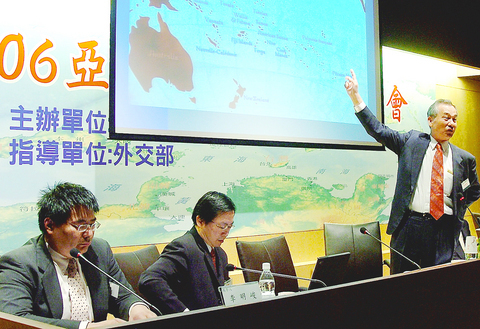With India's increasing influence in the South Asian region, Taiwan might want to extend its "go south" policy to include that country and seek more economic and political cooperation with the developing economy, a top official at the National Security Council (NSC) said yesterday.
"The world is observing the warming relations between the US and India, especially the most recent US-India nuclear agreement, which US President George W. Bush hopes the US Congress will endorse despite the fact that India has not signed the UN's nuclear Non-Proliferation Treaty," council Deputy Secretary-General Parris Chang (
"India sees China as its biggest threat in the region and its alignment with the US reflects a change of course in its foreign policy," he said.

PHOTO: CHU PEI-HSIUNG, TAIPEI TIMES
Chang made the remarks on the last day of the Asia-Pacific Peace Watch conference in Taipei.
The two-day symposium was organized by the Taiwan Peace Foundation. While the first day of the forum focused on the security situation in Northeast Asia, the Taiwan Strait and Southeast Asia, the second centered on South Asia and the South Pacific.
Chang, who chaired the South Asia session yesterday, said that India's ambition to become one of the dominant powers in the region hinged on its relationships with the US and China.
In addition to building closer relations with the US, India last April agreed to forge a strategic relationship with Beijing.
Chen Han-hua (
What Taiwan can do to help is to provide South Asian countries with petrochemical technology, Chen said.
Chen also warned India of the dangers of dealing with the Chinese authorities, pointing out that China is very good at adopting the approach of "using warm water to cook frogs," meaning that the frog does not realize it is dying because it grows used to the warm temperature.
Senior adviser to the president and former vice premier Wu Rong-i (
Wu also emphasized that Taiwan had to become a stronger country before conducting talks with China.
"That is why it is so important for the legislature to pass the arms procurement plan as soon as possible," he said.
Analyzing China's influence in the South Pacific, Chang Yu-chang (
First, China wanted to buy diplomatic relations and isolate Taiwan, he said.
Chang said that China had invested US$4 million to build a stadium in Fiji and US$15.5 million to construct a swimming pool there.
China's generous contributions had won Chinese Premier Wen Jiabao (溫家寶) a ticket to attend this year's China-Pacific Island Countries Economic Development and Cooperation Forum Ministerial Conference in Fiji in April, he said.
Second, China wanted to invest in natural resources in the region, he said.
Chang said that China had obtained the consent of Austria to obtain uranium from that country.
Finally, China wanted to mold the South Pacific to its own strategic requirements in order to counter the US in the region, Chang said.

Chinese spouse and influencer Guan Guan’s (關關) residency permit has been revoked for repeatedly posting pro-China videos that threaten national security, the National Immigration Agency confirmed today. Guan Guan has said many controversial statements in her videos posted to Douyin (抖音), including “the red flag will soon be painted all over Taiwan” and “Taiwan is an inseparable part of China,” and expressing hope for expedited reunification. The agency last year received multiple reports alleging that Guan Guan had advocated for armed reunification. After verifying the reports, the agency last month issued a notice requiring her to appear and explain her actions. Guan

GIVE AND TAKE: Blood demand continues to rise each year, while fewer young donors are available due to the nation’s falling birthrate, a doctor said Blood donors can redeem points earned from donations to obtain limited edition Formosan black bear travel mugs, the Kaohsiung Blood Center said yesterday, as it announced a goal of stocking 20,000 units of blood prior to the Lunar New Year. The last month of the lunar year is National Blood Donation Month, when local centers seek to stockpile blood for use during the Lunar New Year holiday. The blood demand in southern Taiwan — including Tainan and Kaohsiung, as well as Chiayi, Pingtung, Penghu and Taitung counties — is about 2,000 units per day, the center said. The donation campaign aims to boost

The Kaohsiung Tourism Bureau audited six hotels in an effort to prevent price gouging ahead of Korean band BTS’ concert tour in the city scheduled for Nov. 19, 21 and 22 this year. The bureau on Friday said that the audits — conducted in response to allegations of unfair pricing posted on social media — found no wrongdoing. These establishments included the local branches of Chateau de Chine, Hotel Nikko, My Humble House, and Grand Hai Lai, it said, adding that the Consumer Protection Commission would have penalized price gougers had the accusations been substantiated. The bureau said the Tourism Development Act

The Central Weather Administration (CWA) said a magnitude 4.9 earthquake that struck off the coast of eastern Taiwan yesterday was an independent event and part of a stress-adjustment process. The earthquake occurred at 4:47pm, with its epicenter at sea about 45.4km south of Yilan County Hall at a depth of 5.9km, the CWA said. The quake's intensity, which gauges the actual effects of a temblor, was highest in several townships in Yilan and neighboring Hualien County, where it measured 4 on Taiwan's seven-tier intensity scale, the CWA said. Lin Po-yu (林柏佑), a division chief at the CWA's Seismological Center, told a news conference